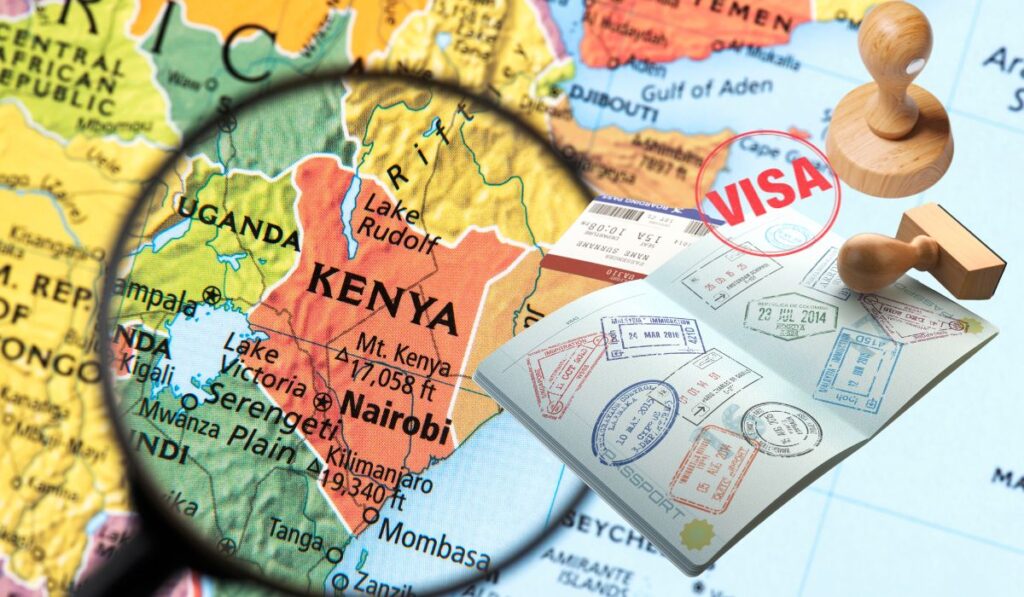The government of Kenya has recently introduced new work permits and made some changes to existing permits in an effort to streamline immigration processes and increase the number of workers in the country.
The new work permits and changes include:
- Class I – They have deleted the previous Class I and made changes including removing charitable organizations/NGOs from this class and created a new class (Class Q) for this as mentioned below. Also, they have removed the processing fee for Class I and made the issuance fee to be Ksh 20,000.
- Reducing the minimum annual salary requirement for the Digital Nomad Visa from $55,000 to $24,000.
- Introduction of Class P – This is for staff of the United Nation, Diplomatic Missions, Inter-Governmental Organizations and International Non-Governmental Organizations accredited to neighbouring hardship countries.
A person based in a neighbouring hardship country who is a staff of the United Nations, a Diplomatic Mission, an Inter- Governmental organization and an International Non-Governmental Organization accredited to the said neighboring hardship country and whose presence in Kenya will be of benefit to Kenya to enable that person and or his dependants to reside in Kenya. - Introduction of Class Q – Professional working for Religious or Charitable Organizations. A person who is a member of a prescribed profe ssion and working for a Religious or charitable organization and who is not involved in preaching or the conduct of religious worship and rituals and whose presence in Kenya will be of benefit to Kenya.
- Introduction of Class R – Citizens of the East African Community. A person who is a citizen of a Member State of the East African Community and is not a prohibited immigrant and who intends to reside, engage in employment, activity, business, trade or engage in any prescribed profession and whose presence in Kenya will be of benefit to Kenya.
The announcement was made by Kenya’s Prime Cabinet Secretary and CS for Foreign and Diaspora Affairs Musalia Mudavadi.
Mudavadi had the following things to say:
“Acknowledging that UN staff are highly paid, their stay in the country is of benefit considering the money they use to pay rent for residences, school, and fees for children. Many of them keep a car and at least a driver and domestic staff. The stay of such persons is also in line with Kenya’s goal of Nairobi being a UN and Multilateral hub.
Those eligible for the new Permit (P) will pay a lower fee but to be charged in United States of America dollars. These workers are usually paid in foreign currency and it is an opportunity for the government to earn foreign currency from them.“
“With these progressive reforms, Kenya continues to champion regional cooperation, economic opportunity, and global engagement, making it a hub where partnerships, talent, and investment can flourish.”
The introduction of Class P was as a result of the United Nations office in Nairobi and other international organizations lobbying the government for a while now for a special status.
Here is a breakdown of the changes:
| Processing Fee | Issuance Fee Per Year | ||
| 9A | Class I: Approved Religious Activities | Gratis (Free) | Ksh 20,000 |
| 9B | Class N: Digital Nomad | $200 | $1,000 |
| 9C | Class P: Staff of the United Nation, Diplomatic Missions, Inter-Governmental Organizations and International Non-Governmental Organizations accredited to neighbouring hardship countries. | $200 | $1,000 |
| 9D | Class Q: Professional working for Religious or Charitable Organizations | Ksh 20,000 | Ksh 100,000 |
| 9E | Class R: Citizens of East Africa Community | Gratis (Free) | Gratis (Free) |
But the biggest win has to be for the citizens of countries in the East Africa Community (EAC) with the introduction of Class R. This new permit will allow them to live and work in Kenya without paying any processing or annual issuance fee.
They will only be required to provide proof of citizenship of one of the EAC countries.
Countries in the EAC include:
- Burundi
- Democratic Republic of the Congo
- Kenya
- Rwanda
- Somalia
- South Sudan
- Tanzania
- Uganda
However, what does this mean to the Kenyan workforce? Kenya has an unemployment rate of about 6%.
- We will see more foreigners reside in the country based on the new Class P
- More EAC nationals will come to Kenya to seek better employement
- A rise in remote workers residing in Kenya after the introduction of the Digital Nomad permit and the reduction of the minimum annual income.


